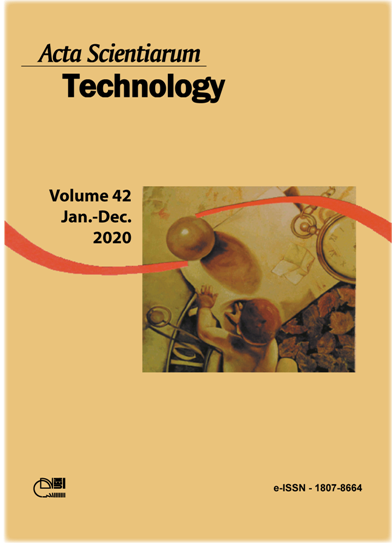Evaluation of the biodegradation of phthalic contaminants originated from polyvinyl chloride commercial films
DOI:
https://doi.org/10.4025/actascitechnol.v42i1.47010Keywords:
plasticizer, organic contaminant, bioremediation.Abstract
The excessive use of phthalates (PHEs) plasticizers has promoted a serious environmental problem. This study evaluated the biodegradation of PHEs from polyvinyl chloride (PVC) film, aiming to mitigate damage to the environment. Therefore, 23 microorganisms were prospected and isolated from the Serra do Ouro Branco State Park (Minas Gerais, Brazil), where screening was carried out by growth in enriched microbial medium and esterase-activity was monitored by diffusion in solid agar. Three microorganisms were selected. Bacterium (I) presented the highest esterase activity, as evidenced in the diffusion tests in solid medium. Further, evidence of this is given by the biodegradation of PHEs into phthalic acid, because changes the acid concentration from 0 to 3.10 ± 0.07 mol L-1 and 28 % mass reduction of PVC film after 24 days. Furthermore, after six days of biodegradation the number of viable cells and ammonia concentration showed no significant change. This indicates that the survival of the Bacterium (I) cells is independent of ammonia consumption, but rather depends on PHEs consumption. The detection of the organic functions of -COOH and - COOR proved the biodegradation of PHEs by Bacterium (I), thus demonstrating its potential to be used in bioremediation of soils and rivers from PHEs contaminants.
Downloads
Downloads
Published
How to Cite
Issue
Section
License
DECLARATION OF ORIGINALITY AND COPYRIGHTS
I Declare that current article is original and has not been submitted for publication, in part or in whole, to any other national or international journal.
The copyrights belong exclusively to the authors. Published content is licensed under Creative Commons Attribution 4.0 (CC BY 4.0) guidelines, which allows sharing (copy and distribution of the material in any medium or format) and adaptation (remix, transform, and build upon the material) for any purpose, even commercially, under the terms of attribution.
Read this link for further information on how to use CC BY 4.0 properly.















8.png)




